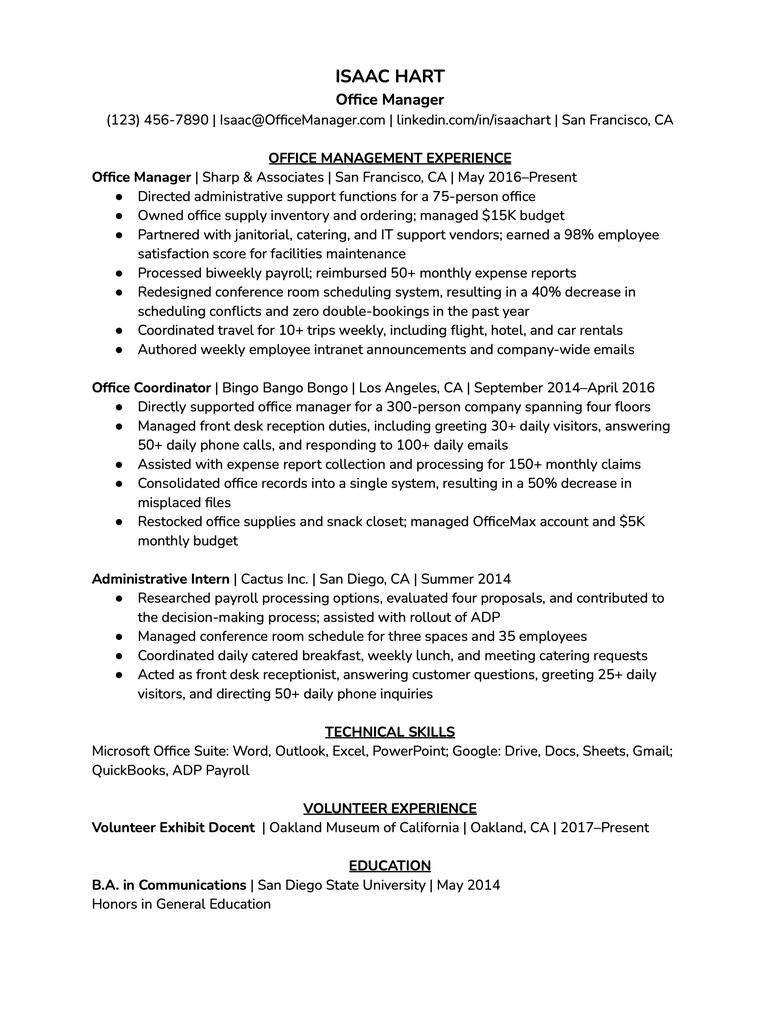
I can’t even begin to count the number of times my favorite office manager saved my you-know-what. As a busy recruiter, I was constantly submitting last-minute conference room requests, frantically printing candidate resumes on the notoriously finicky copy machine (that would inevitably jam at the most inopportune moment), or desperately searching the snack closet for my favorite treat to get me through a hectic day. Sometimes I had to book sudden, next-day travel arrangements or needed help organizing an office-wide lunch. Other times I just wanted someone to talk to.
Can you guess who I’d turn to for help with every single one of these harried needs? Yep, my company’s incredible office manager. And, obviously, helping me wasn’t her only job. She was the ultimate multitasker. Cool, calm, collected, and hyper-organized, she kept that place running like a well-oiled machine.
It’s not an easy job, but if you’ve got a knack for problem-solving, love dreaming up process improvements, and enjoy being your team’s go-to resource, office management can be fun, exciting, and incredibly rewarding.
If you’re in the market for a new office manager position—whether you’re a seasoned veteran or an aspiring newbie—you’re going to need an awesome resume to showcase your exceptional organizational skills and accomplishments. Read on to learn how to write the perfect office manager resume.
What Does an Office Manager Do?
Office managers are the glue that holds an office together. The role varies from one company to another, but you can almost always count on an office manager to oversee office supply inventory and ordering, manage records, supervise the administrative or front desk function, assist with meeting planning, and draft or proofread communications. In some cases, they process payroll or book travel arrangements. And sometimes they manage a team, too. Basically, they do whatever is necessary to keep the office running.
How to Write a Standout Office Manager Resume
When it comes to office manager resumes, recruiters will be looking for all the usual suspects: applicable experience, relevant keywords, quantifiable accomplishments, the right technical skills—all contained within an easy-to-read, error-free document. As with any search, a recruiter is going to use your resume to assess whether you’re likely to be qualified for and perform well in the role for which they’re recruiting. Here’s how to show you’ve got what it takes.
1. Lead With Your Most Relevant Skills
Because an office manager’s responsibilities can vary so widely from company to company, it’s essential that you pay close attention to each job posting you apply to. Tailoring your resume to reflect each prospective employer’s specific needs will increase your chances of landing an initial interview.
So while it’s great that you’re a whiz at processing payroll, you probably don’t need to emphasize that skill if there’s no mention of payroll processing in a particular job description. On the other hand, if a job description lists vendor management at the very top of the post, you’ll want to prominently feature your relevant experience building strong vendor relationships.
2. Nail the Keywords
Remember, most applications get filtered through an applicant tracking system (ATS) before a recruiter ever lays eyes on them, so make sure that yours includes keywords that signal to the system that you’re qualified for the job.
Including common office management lingo like scheduling, office supply management, and budgeting will give you a great foundation. But since the most effective keywords will vary from one job to another, tailoring your keywords to reflect the skills and experience a specific job description calls for is essential.
At a loss for (key)words? For inspiration, you can refer to this handy word bank of common office manager skills and duties.
- Administrative Support
- Billing
- Bookkeeping
- Budgeting
- Calendaring
- Customer Service
- Communications
- Document Management
- Executive Support
- Expenses
- Facilities Management
- File Management
- Inventory
- Invoicing
- Meeting Coordination
- Office Supply Management
- Payroll Processing
- Project Management
- Proofreading
- Reception
- Report Generation
- Research
- Spreadsheets
- Travel Arrangements
- Vendor Relations
3. Use Clear, Concise Bullet Points
Using bullet points is the most effective way to highlight your experience and qualifications. Recruiters are busy people, so they don’t want to get stuck reading dense paragraphs or super long sentences (who can blame them?).
You’ll generally want to include somewhere between five and seven bullet points for any given job. That should give you enough space to describe the scope of your responsibilities (and showcase your achievements!) without losing your reader’s attention.
Crafting a compulsively readable bullet point is easier than you might think. Just follow this simple formula:
- Action verb + job duty + outcome
Here’s what that might look like:
- Designed new office refreshments ordering process, resulting in a 30% decrease in wasted food and a 72% increase in employee satisfaction
4. Incorporate Tangible Numbers and Outcomes
Be specific! Did you oversee the conference room schedule for a large office? Great! How many rooms did you manage? How many meeting requests did you process each day? How many people worked in your office? The more detail you can provide about a specific job duty, the better. Just look at the difference between these two bullet points:
- Oversaw conference room scheduling for busy office
vs.
- Managed schedules for eight conference rooms, booking up to 35 daily requests from 350+ employees
The second bullet point is much stronger, right? Incorporating quantifiable details helps bring an otherwise vague or generic-sounding job duty to life. And that’s the sort of thing that will grab (and hold!) a hiring manager’s attention.
5. Remember to Include Your Technical Know-How
A top-notch office manager will be a whiz at Microsoft Office Suite, Google Drive, and some type of payroll processing system. They might also know their way around a copy machine or have a bit of IT troubleshooting experience under their belt. Whatever your specific technical skills are, be sure to list them on your resume—especially if you notice them popping up in a job description.
6. Skip the Summary—Unless...
If you’ve got a few years of office management experience under your belt, a summary probably isn’t necessary. Your work history will speak for itself! But if you’re newer to the space, a brief summary could help to frame your relevant experience, thus making your application more appealing to prospective employers. Need a little summary statement inspiration? You’ll love these examples.
7. And as Always, Don’t Forget the Basics
I almost always recommend using a chronological resume format. You’ll also want to keep it to a single page (you can typically cut experience that’s more than 10 years old), use compelling verbs, tailor the content to reflect the job posting, and proofread the heck out of the final draft before you click submit.
Now for an Example!
Below is a sample of what a great office manager resume might look like. But remember, resumes are like snowflakes, all unique in their own special way. So yours will probably end up being different from this example—and that’s just fine.

Download an Example Office Manager Resume
As an office manager, you’re basically the company superhero—and your resume should reflect that! Don’t be shy about showcasing your incredible abilities on your resume (it’s OK to brag a little). That’s what resumes are for.